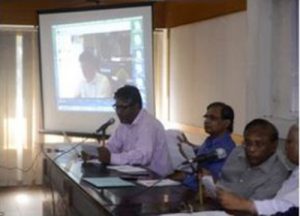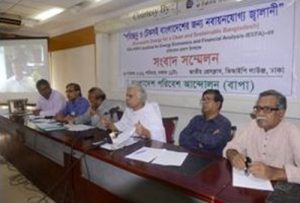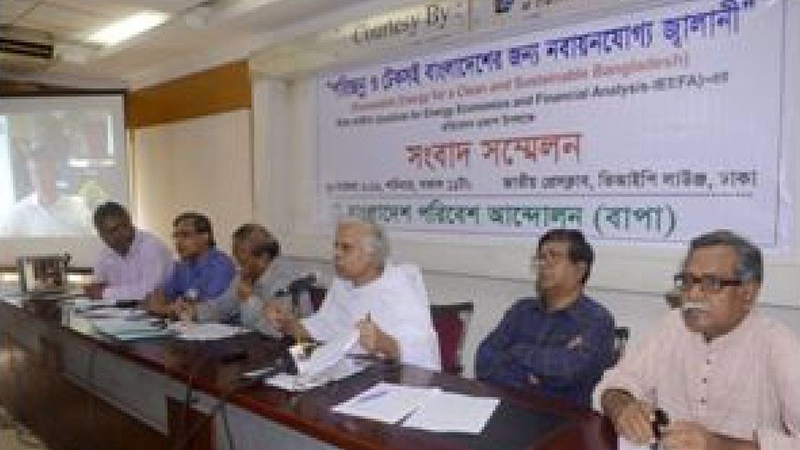
Institute for Energy Economics and Financial Analysis (IEEFA) released a report proposing a viable,modern and sustainable electricity generation expansion in Bangladesh.

The report entitled “Bangladesh Electricity Transition: A Diverse, Secure and Deflationary Way Forward”, gives a sustainable diagram to across the country power generation development that would be cheaper, cleaner and provide more energy security than the government’s’ current plans. The Bangladesh Poribesh Andolon (BAPA) organized the report-launching press conference at the VIP lounge in National Press Club on 19 November 2016, Saturday on behalf of IEEFA.
Syed Abul Maksud, Vice President of BAPA, Prof. Anu Muhammad, Member Secretary of National Committee to Protect Oil, Gas, Mineral Resources, Power and Ports, Prof. Eng. BD Rahmatullah, former Director General of Power Cell, Bangladesh, Prof. Badrul Imam, Department of Geology, University of Dhaka and Prof. M. Saiful Hoque, Director of the Institute of Energy, University of Dhaka delivered their speech as the designated discussant in the meeting.
Sharif Jamil, Coordinator of Waterkeepers Bangladesh and Joint Secretary of BAPA presented the executive summary of the report while Tim Buckley, IEEFA’s director of Energy Finance Studies, Australasia, and lead author of the report was connected to Skype to give the speech and answers to the open questions. He said, “Our research models an affordable, more sustainable and faster-to-implement alternative electricity plan for the coming decade. The key ingredients would enhance grid efficiency, energy efficiency and build a ten-fold increase in solar energy in all its forms.” The experts and environmental activists rejected the draft Power System Master Plan- 2016 and demanded a fresh one focused on cheap renewable sources for electricity generation.
Electricity generation is one of the major problems hindering the economic success in Bangladesh and many obstacles are working behind the development of this important sector. In this point, the report recommends that Bangladesh immediately targets a 1GW annual utility-scale solar program that would see 10 GW of cumulative capacity operational by 2024/25. It urges Bangladesh to re-evaluate its entirely subsidized plans for ever more imported thermal power capacity. Meanwhile, Bangladesh’s plan to double fossil fuel generation capacity to 24 GW by 2021 would instill a long-term dependence on fossil fuel imports. Supporting this Buckley said, “The government’s ‘Access to Electricity for All by 2021’ campaign can be effectively delivered by redoubling efforts on the solar home system program,”. “This will rapidly eradicate energy poverty and facilitate health and education improvements where they are most needed in rural Bangladesh.”
Strongly supporting the IEEFA’s model, economist and member secretary of National Committee to Protect Oil-Gas-Mineral Resources and Power –Port, Anu Muhammad said that the government should scrap the draft Power System Master Plan- 2016. ‘It focused on import-based fossil fuel for electricity generation, which would pose a big threat to the national energy security’, he added. He suggested that the government should outline a fresh master plan keeping renewable energy like solar energy in focus for long-term power generation. He added that long-term plan for electricity generation should consider people’s interest, environment, and economy.
Singing the same tune, columnist Syed Abul Maksud said, ‘We want an adequate supply of primary fuel and electricity.’ He also claimed that the policy the government adopted in the energy sector was suicidal and meant to benefit only bureaucrats and politicians. “We have huge potential to tap solar energy,” said Saiful Huque, professor and director of the Institute of Energy of the University of Dhaka, citing that it is possible to generate 5-6 MW of electricity through rooftop panels. He said days were not that far when the size of solar panels would reduce and thus condense the space requirement for installation.
Badrul Imam, the professor at the Department of Geology, Dhaka University said, ‘The falling prices of solar have widened the scope for Bangladesh to generate increased amount of electricity through renewable sources’. The price at Rs 4-5 per kilowatt is cheaper than the cost of coal, “The government gives importance to the costly fuels instead of cost effective sources. Hence that the dependence on coal will be dangerous,” he also added.
Other than solar, Bangladesh has huge potential for electricity generation from wastes, said BD Rahmatullah, former director general of Power Cell of the Ministry of Power, Energy & Mineral Resources.

Further, IEEFA’ is very fortunate that Bangladesh can look forward to a continued period of strong economic growth and development. And its electricity sector should play a critically important role underpinning sustainable development. IEEFA’s electricity system model is an example of a cost-effective long-term investment program that prioritizes renewable energy, grid and energy efficiency, and expanded electricity imports from India and Bhutan would best serve the country in terms of energy security in comparison to heavy reliance on fossil fuel imports, and would deliver a significantly larger, long-term cost-competitive energy supply.
The key findings of IEEFA report are:
- Fossil fuel subsidies and electricity-sector losses are an entrenched and growing drag on economic growth in Bangladesh.
- Current plans to double fossil fuel generation would instill a long-term dependence on fossil fuel imports, which would lead to more national debt, devaluation of the currency and an
